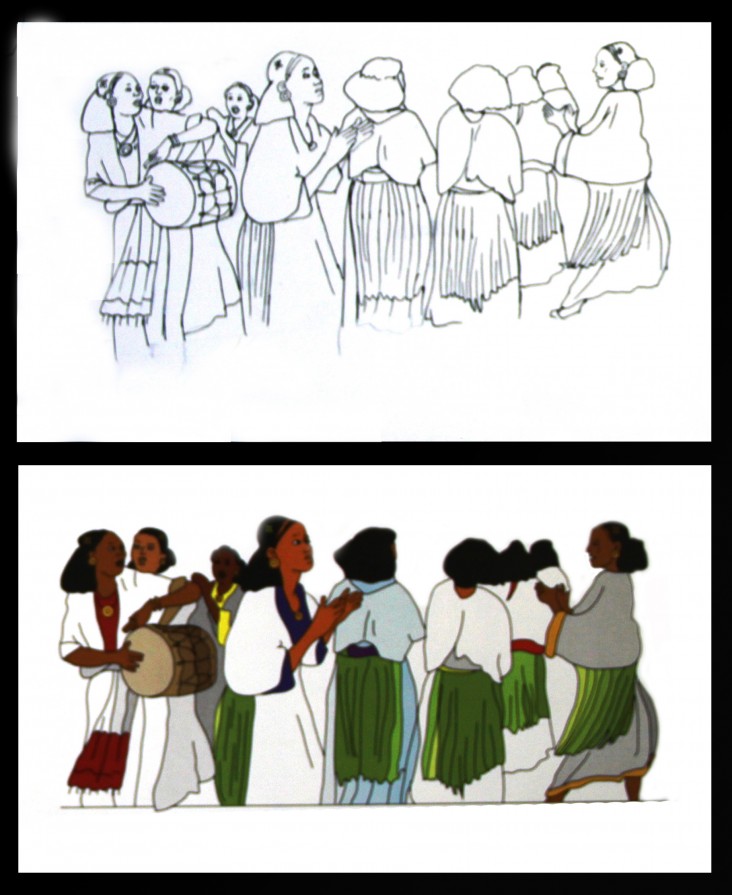April 2014—With some 80 different ethnic groups and approximately 90 million people living in Ethiopia, providing quality education is the single biggest challenge and priority for the country’s Ministry of Education.
A USAID-supported Early Grade Reading Assessment performed in 2010 revealed surprisingly poor results in reading achievement. By the end of grade two, 34 percent of students were unable to read even one word and 48 percent of students scored a zero in comprehension. Teachers were not adequately trained to teach in ways that promote student learning. The lack of curriculum and textbooks, teacher's guides, and supplemental reading materials exacerbated the low levels of achievement.
Launched in late 2012, the five-year Reading for Ethiopia’s Achievement Developed-Technical Assistance program, implemented by Research Triangle Institute, is making major progress. USAID and the Ministry of Education created mother tongue syllabi for grades one through eight. Another major achievement is also complete—creating grade one through four textbooks in seven different mother tongue languages primarily spoken in Ethiopia—Amharic, Tigrigna, Afaan Oromo, Af-Somaali, Sidama Afoo, Wolayttatto and Hadiyyisa.
To address this major challenge, the Ministry of Education, working closely with USAID, began developing a national level intervention in early grade reading in 2011 that included a revised primary school language curriculum. The use of mother tongue languages in primary school is now government policy. Primary school teachers have to build on the spoken language and everyday experience of the child. After laying a solid educational foundation in the child’s first language, the child can then learn through official or foreign languages.
Selected by their regional education bureaus, a team of 13 people for each language—four teachers, four language experts, four story writers, and one language and curriculum expert—joined with USAID advisers to tackle the challenge. In January 2014, the seven teams came together in Addis Ababa for one month of intensive work.

“Our aim is to produce materials that will enable students to learn in a short period of time,” said Tolemariam Fuffa, a language consultant. The goal was to produce 28 separate reading books—each with 150 separate lessons that would coincide with the newly approved syllabus.
“The Ministry’s teams took to heart the intense operation of producing 4,200 different lessons,” said Michelle Chen, education office director at USAID/Ethiopia. The collaboration allowed the seven teams to share facilities and expertise, and facilitated the overall production. Moreover, the process expanded the Ministry’s capacity to undertake similar endeavors in the future. Developing the textbooks involved not only creating appropriate texts in each language, but also adapting illustrations to settings familiar to the different groups of children.
The next hurdle is to train Ethiopia’s 200,000 teachers on how to use the new materials. USAID’s program will work with the Ministry to oversee and train master trainers for the teachers. Curricula and textbooks will be printed and distributed through a multi-donor fund.
The teachers are excited about the significance of the project. “I am anxious to go back and use the new material. The linkage of story and illustration is very smart,” said Abebech Tesfaye, a teacher and language specialist. “We love the American people and we thank you very much,” exclaimed Abebech. “This is a great contribution!”
USAID’s Reading for Ethiopia’s Achievement Developed-Technical Assistance program aims to enable 15 million Ethiopian students to read at levels commensurate with the standards set for their grade level by 2017. “Our goal is to enable a whole generation of young Ethiopians to learn to read so then they can read to learn and lead productive lives,” said Chen.
Improved learning outcomes for the next generation will lead to a more skilled and better prepared workforce and a more prosperous Ethiopia.
Links
Follow @USAIDEthiopia, on Facebook, on Flickr







Comment
Make a general inquiry or suggest an improvement.